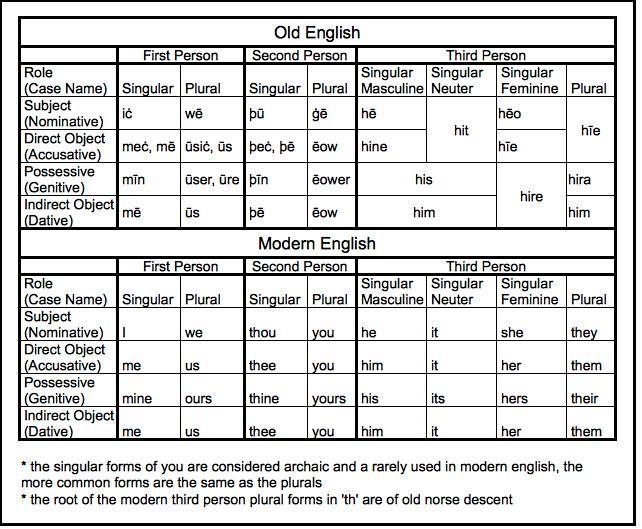In this second part of the "Intro" segment, we go over some different regions and ethnicities in Old English, as well as a few occupations. We also take a look at pronouns in Old English.
Check out this episode!
And here's the Intro Presentation again.
Our "conversation with Alfred"
Me
Alfred
“wes þū hāl”
“wes hāl”
“hū hātest þū?”
“Iċ hātte Alfred, and þū?”
“Iċ hātte Bob. Hū gǣþ?”
“Iċ eom gōd, and þū?”
“Iċ eom gōd eac, þancie þē.”
“Þū eart Englisc, ac iċ neom. Iċ eom of ofer þære sǣ. Iċ eom wealh.”
This next part is taken from the text in First Steps in Anglo Saxon by Henry Sweet.
“Hwelċne cræft canst þū?”
“Iċ eom hunta”
“Hwæs hunta eart þū?”
“Iċ eom þæs cyninges hunta”
“Hwelċne cræft canst þū?”
“Iċ eom fiscere.”
“Hwæt beġietst þū of þīnum cræfte?”
“Bīleofan iċ mē beġiete, and scrūd, and feoh.”
“Hū ġefēhst þū þā fiscas?”
“Iċ gā on mīnne bāt, and rōwe ūt on þā ēa, and weorpe mīn nett on þā ēa.”
My summary in Old English (it's not poetry)
My summary in Old English (it's not poetry)
Ælfric wæs Englisc munuc, and hē wrāt þæt “colloquy”. In ūre colloquy, wē spræcon mid Alfred. Wē sæġdedon ēalā. Þā, hē spræce meċ, and him spræc iċ. Hē is hunta, se hunta þone cyninges. Iċ sæġdede þæt iċ wæs fiscere.
Some Locations Around the World (known at the time)
Region Name People Adjective
Englaland Angelcynn EngliscĒast Angla Rīċe
Miercna Rīċe
Norþymbra Rīċe
Westseaxna Rīċe Westseaxe
Ēast Seaxna Rīċe Ēastseaxe
Cantaware Rīċe
Sūþseaxna Rīċe
Denemearc Dene Denisc
Grēcland
Swēoland Swēon
Ispānia Ispānisc
Itālia
Ēgypte Ēgypte
(France) Frencisc
Gallisc
(Germany) þēodisc
Some Occupations
On ċiriċe
Munuc - Monk
Biscop, bisceop, biscep - Bishop
Pāpa - Pope
On þæt land
Æcermann - Farmer
Ierþling - Farmer, plowman
On þæm sǣ
Flotmann - Sailor
Fiscere - Fisherman
Mid dēor
Scēaphierd - Shepard
Oxanhierd, Nīþerhierd - Ox herder
Hunta - Huntsman
Fuglere - Fowler
On þonne tūn
Ċīepemann - Merchant
Mangere - Merchant
Scōwyrhta - Shoe maker.
Sealtere - Salter
On þæt hūs
Bæcere - Baker
Cōc - Cook


Quick question -- it's "Iċ hātte, þū hātest" ? The double T isn't consistent through the conjugation?
ReplyDeleteThis page indicates that there's no double T at all AND there's a present-tense vowel shift but I don't know if they're trustworthy: http://hord.ca/projects/eow/grammar/verb.php?id=2942&output=macron
Hātte is used as the passive, or medio-passive and essentially means "call myself", where as the regular verb has the 1st per. sng. as hāte. So "Iċ hātte Bob" is "I am called (call myself) Bob", and "Iċ hāte Bob" is more like "I command (order or call) Bob". Alfred's Pastoral care has a line "þe cyþan hate" which is literally "you (acc.) make known (I) command" which should be translated as " order you to be informed".
ReplyDeleteAs far as the second person goes, we just don't know what word was used. The regular strong verb conjugation would have "hǣtst", but this means "You command/order", there are examples of "hātte" being used as a 3rd person, so it may have been used as the 2nd pers., but then there are other forms that are sometimes used and sometimes not. "Hātest" or "hāttest" would be the most predictable form, and make the most sense. Either way, it would be hard to misunderstand the question if using any of the three forms: "hātte", "hātest" or "hātest".
Thank you! That makes sense.
ReplyDeleteHoly sh... :)
ReplyDeleteI am german speaking, but I really love english. So I just came round to a quick listen and I am surprised that old english is so very much different from the modern one. Honestly I was not able to understand a simple old english sentence here (esp. without written text) but I really enjoyed the episodes!
The syntax though often remembers me of the german way sentences are built. It seems to me that there were much more german influences in old english than in modern. Maybe this is obvious, I am not a language-savvy person, just interested :)